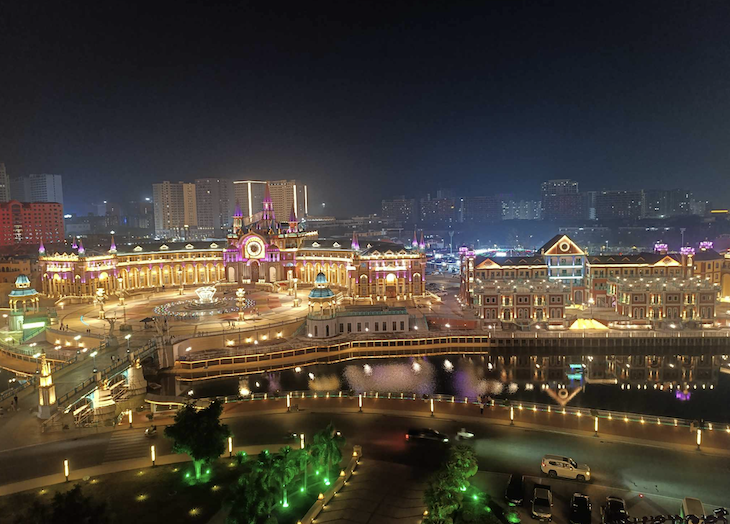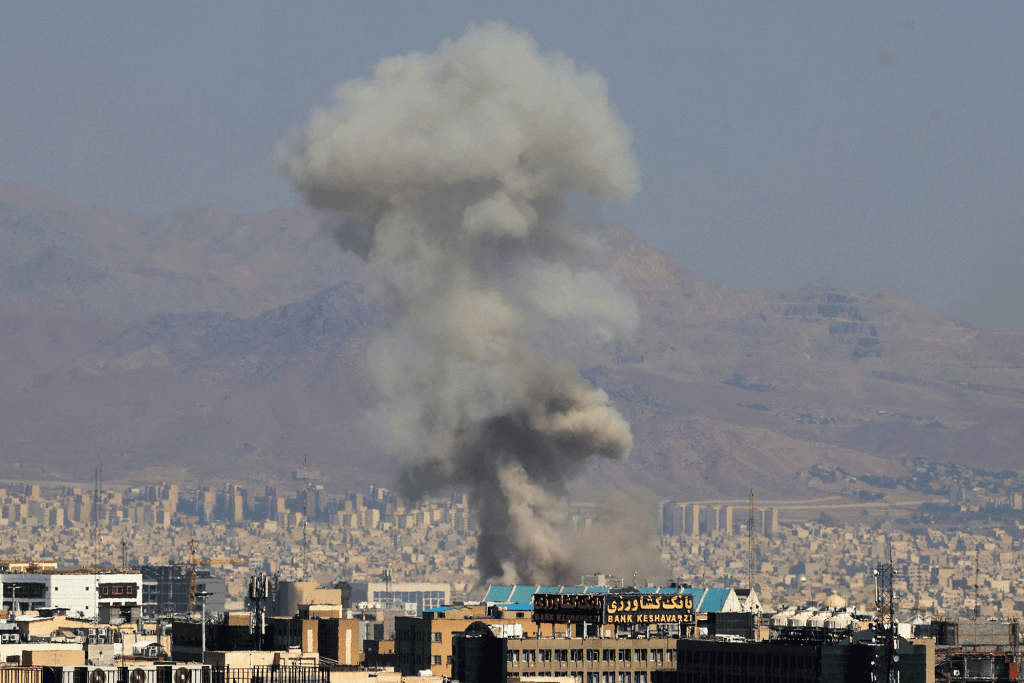A rickety boat took me across the murky, brown waters of the mighty Mekong River from Chiang Saen in Thailand, with its giant golden Buddha perched on the hillside, to the Golden Triangle Special Economic Zone (SEZ) in supposedly communist Laos. But the SEZ is neither particularly communist, nor even really a part of Laos.
‘Tonight is boom-boom night,’ he said. ‘You can do anything you want with a girl for 500 yuan (£50)’
‘This is not Laos, this is China,’ an Indian migrant worker told me. The Laotian authorities’ presence here is minimal. The Chinese yuan, emblazoned with the image of Chairman Mao, is the currency of choice.
While parts of Laos still resemble Vietnam as portrayed in old war movies – rice paddies, bamboo houses on stilts, limestone karst mountains – here the architecture can be generously described as ‘eclectic’. Standing tall over the city-like complex is the gilded tower of the Kings Roman Casino and hotel. Laying directly opposite is a canal, with a Disney Palace version of Venice on one side, and a Chinatown on the other – a bizarre juxtaposition, perhaps, but it sure looks pretty lit up at night.
The Golden Triangle – the triple-frontier between Myanmar, northern Thailand and Laos – has historically been home to opium warlords. While they’re still very much there, it’s been a while since this part of the world has hosted such a blatant criminal colony.
The Golden Triangle SEZ is a sinister Sin City. At the heart of it is an alleged Chinese crime lord named Zhao Wei. In 2007, Zhao negotiated a 99-year lease over the land with the Laotian government. It proved to be a wise investment. Gambling is illegal in mainland China and several years ago a clampdown to clean up the casino industry on the island of Macao (long-known as the Chinese Las Vegas) sent punters scurrying to the new gaming havens scattered throughout Southeast Asia. By then, Zhao, a Macao casino tycoon himself, had carved out his Laotian enclave, catering to an almost exclusively Chinese clientele.
The security inside the opulent hotel confiscated my laptop for ‘safekeeping’, something that in all my travels around the world had never happened before. Outside the main strip, the streets were largely deserted, aside from a handful of migrant workers, South Asians, Africans and Burmese. Blank storefronts revealed empty façades. It’s obvious much was still under construction.
As I wandered the streets, a group of Indians waved me over to a bar. ‘You are from Russia?’ one of them asked me. I was born in Leningrad.
‘I can tell from your face; I was in Dubai for five years. A lot of Russian girls are working here too, as models. The customers think they’re chatting to the model, but actually they’re talking to me. I am so good, once a customer complained to me that he got cheated by another girl – and I am another scammer, but he trusts me!’
It’s an incredibly frank admission to someone you’ve just met, as if he’d merely told me he worked in accounting. But that goes to show how safe he feels here. My new friend worked at a scam centre, one of those IT startups that specialises in relieving hapless victims of the contents of their online wallets. Pulling out his phone, he showed me a dozen or so different Facebook and Instagram profiles, all under different names. Pretending to be a beautiful young lady, he dupes marks into dodgy crypto investments, a scheme known as ‘pig-butchering’. Fellow fraudsters in his WhatsApp group brag about pulling in $10,000-$15,000 (£8,000 to £12,000) at a time. Move over, Nigerian princes, there’s a new game in town.
There’s no shortage of horror stories of foreigners being kidnapped and forced to work in these scam centres, trapped in nightmarish conditions. In fact, it forms the basis for the blockbuster Chinese movie No More Bets. But this Indian and his friends are seemingly here willingly. For them, it’s only a job. ‘We are just here for work,’ he said. ‘We make some money and we go home.’
Pretending to be a beautiful young lady, he dupes marks into dodgy crypto investments
That being said, fraud is not the only seedy industry here. ‘Tonight’s our night off. Tonight’s boom-boom night,’ added another Indian. ‘You can do anything you want with a girl for 500 yuan (£50).’
Women’s rights groups say hundreds of young, poor and naïve Laotian women have been lured to the SEZ with promises of easy money chatting up clients at the casino. Yet when they can’t meet their sales quotas, they soon find themselves in debt which they must pay off any way they can. I spotted several spa parlours, nearly all staffed by scantily-clad young ladies presumably offering more than a massage. Hotel rooms at the King’s Roman come with a pack of condoms included.
Then there’s narcotics. Nearby Myanmar is now the world’s leading exporter of illicit opium, which is then refined into heroin. It is also a major source of crystal meth, ketamine and fentanyl produced in secret jungle laboratories, which are dispatched worldwide by Chinese triad syndicates. Special Economic Zones enjoy certain tax perks and duty-free storage which are designed to stimulate trade. But their loose oversight allows smugglers to take advantage of weak inspections and co-ordination between customs agencies to use them as transhipment point and disguise a shipment’s real origin. Large drug busts have been linked to the Golden Triangle SEZ.
Some of the profits no doubt end up in the casinos. On a visit in 2023, Crisis Group observers witnessed duffel bags full of cash being passed around openly on the casino floor at the Kings Roman. In 2018, Zhao Wei was namechecked by the US government over a litany of alleged misdeeds including narcotics, child prostitution and wildlife trafficking (the businessman strenuously denies the accusations). But it doesn’t look like his kingdom’s going anywhere. Last year, Zhao was officially honoured by the Laotian government for his work in developing the impoverished nation.
It’s worth remembering that Las Vegas, too, was just a small town in the middle of the desert until the 1940s, when Bugsy Siegel and other New York mobsters had a vision of transforming it into a casino mecca. For decades, Vegas was run by the Mafia until they were eventually pushed out by corporations. Could the Kings Roman, too, one day go legit?







Comments